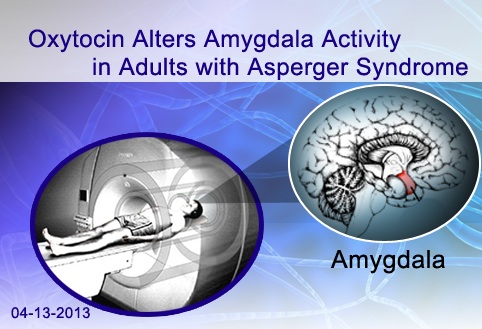Check out other stories from the Latest News
Oxytocin Alters Amygdala Activity to Social Stimuli
By Shana R. Spindler, PhD on April 11, 2013

Background: Oxytocin is a hormone that is produced in the brain and released into the bloodstream and central nervous system, where it binds to oxytocin receptors on cells. Its role in helping labor contractions was discovered in the early 1900s, but more recently scientists have examined oxytocin’s ability to mediate social behaviors, presumably by modulating activity in the amygdala—a brain area known to be involved in social and emotional information processing.
What’s New: In a study published online March 6, 2013, in the journal Biological Psychiatry, researchers tested the effect of intranasal oxytocin supplementation on brain activity in response to social stimuli. The researchers administered either oxytocin or placebo, in a double-blinded manner, to 14 adult male volunteers with Asperger syndrome (AS) and 14 neurotypical control participants. They then measured amygdala activity using functional magnetic resonance imaging (fMRI) while the participants viewed images of houses and faces. Oxytocin supplementation significantly increased amygdala activity in response to faces, as compared to houses, in AS participants but not in controls. The placebo did not cause the same effect.
Why it’s Important: Ongoing clinical trials are testing if therapeutic oxytocin can alleviate social cognition difficulties in children and young adults with autism spectrum disorder (ASD). This is the first study to show an oxytocin-induced increase in amygdala activity during facial processing in individuals with Asperger syndrome.
Help me understand :
| Source(s) : |
| Tweet |

